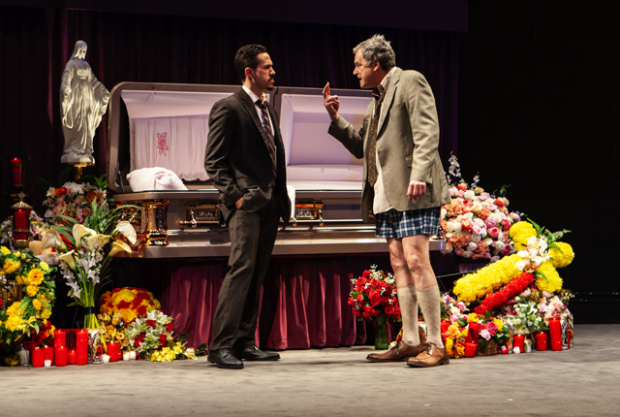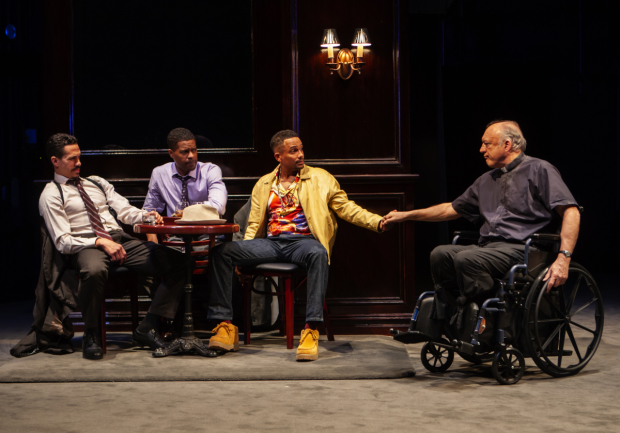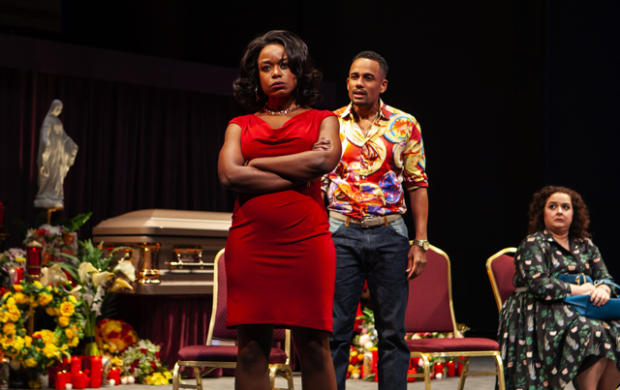Signature Theatre Pays a Visit to Our Lady of 121st Street
Phylicia Rashad breathes life into a Harlem community in one of Stephen Adly Guirgis’s early plays.

(© Monique Carboni)
Our Lady of 121st Street marks the second production of Stephen Adly Guirgis's yearlong residency with Signature Theatre, following the company's fall revival of Jesus Hopped the 'A' Train, which is now raking in award season acclaim. Our Lady of 121st Street is an equally accomplished production, with director Phylicia Rashad building a vibrant yet subtle energetic network within her brilliant ensemble of actors. And placed side-by-side with Jesus Hopped the 'A' Train, the revisited production shows the breadth of Guirgis's early work, which ranges from a pointed examination of the justice system to a free-flowing look at the flawed people who compose a community.
Our Lady of 121st Street debuted off-Broadway in 2002, first with the LAByrinth Theater, followed by a run at the Union Square Theatre. But aside from a nostalgic reference to Rudy Giuliani's recently completed mayoral service — which now adds an extra laugh to the opening scene — there's nothing in the play that's indelibly linked to any particular time period (Alexis Forte's costumes subtly suggest a just-post-millennium New York). Replace the flip phones with iPhones and the characters on 121st Street are probably living the same interconnected lives.
They likely also have the same unassuming heroes, which in this case, is Sister Rose, a nun who at one point or another, taught, encouraged, or gave a dose of tough love to everyone in the neighborhood. She's the community saint who died in the most unsaintly way — succumbing to alcoholism and subsequently getting her body stolen by someone who also stole the pants off one of her mourners (John Procaccino playing the irate and pants-less Victor, who misses Rudy's take-no-prisoners approach to governance).
Victor opens the show ranting about the crime to a police officer named Balthazar (Joey Auzenne, speaking with the underwhelmed fatigue of a jaded veteran), both standing beside the coffin that should be holding the deceased nun. Considering the story begins with an empty casket and a cop, you'd expect an element of whodunit to carry us along. And yet, solving the mystery probably wouldn't even make the list of concerns if the subject of this particular body snatching weren't so beloved. There are many more pressing affairs among Sister Rose's disciples and those are the ones we spend time observing while they're all gathered for this unconventional reunion.

(© Monique Carboni)
A loquacious man named Rooftop (a standout performance by Hill Harper) makes his first trip to confession in 30 years where he proceeds to vomit 30 years of thoughts onto Father Lux, a paraplegic priest with years of experience but waning faith (John Doman is beautifully quiet in the portrayal of his character's despair). Meanwhile, Rooftop's ex-wife Inez (Quincy Tyler Bernstine wearing Inez's voice and posture like a glove) shares a drink with Norca (a volatile woman with childhood grudges played by Paola Lázaro), who Inez hasn't seen since before Norca's affair with Rooftop. Then there's Edwin (Erick Betancourt) and the mentally stunted brother he looks after, Pinky (Maki Borden); Marcia (Stephanie Kurtzuba), Sister Rose's niece whom Edwin saves from an asthmatic fit inside the funeral home; Marcia's aimlessly wandering friend Sonia (Dierdre Friel), who amusingly pops up in scenes like Where's Waldo; and Flip (Jimonn Cole), a gay lawyer who hides the identity of his partner Gail (a hilarious Kevin Isola) and returns to his childhood nickname around his buddies Balthazar and Rooftop for the sake of assimilation.
Walt Spangler's sectioned scenic design perfectly accommodates the play's vignettes, which begin as their own mini-plays but bleed together into the single space of the funeral home waiting room by Act 2. It also gives a semblance of structure to an amorphous narrative where conflicts are left unsettled, crimes are left unsolved, and goals are left extremely undefined. That essentially means the play's ending is where Guirgis abruptly decides to stop showing us the lives of his characters. But if after Our Lady of 121st Street we feel somewhat unsatisfied, that means we're hungry for more.

(© Monique Carboni)










